- Home
- Penny Jordan
A Secret Disgrace Page 2
A Secret Disgrace Read online
Page 2
All the same, she had to grit her perfectly straight, neat white teeth very hard to stop herself giving vent to her real feelings. It was none of his business that she and her mother had never been close, with her mother always being far more concerned with her next affair or party than having a conversation with her daughter.
In fact she’d been absent more than present throughout Louise’s life. When her mother had announced she was leaving for Palm Springs and a new life Louise had honestly felt very little other than a faint relief. Her father, of course, was rather a different story—his constant presence served as an endless reminder of her own failings.
It was a moment before she could bring herself to say distantly, ‘I was in my final year of school in London when my parents divorced, so it made sense for me to move in with my father. He had taken a service apartment in London, since the family house was being sold and my mother was planning to move to Palm Springs.’
His questions were far too intrusive for her liking, but she knew that to antagonise this man—even if she was coming to resent him more with every nerve-shattering dagger-slice he made into the protective shield she had wrapped around her past—would prove to be counterproductive. She was determined not to do so.
All that mattered about this interview was getting this arrogant, hateful overlord’s agreement to the burial of her grandparents’ ashes in accordance with their wishes. Once that was done she could give vent to her own feelings. Only then could she finally put the past behind her and live her own life, in the knowledge that she had discharged the almost sacred trust that had been left to her.
Louise swallowed hard against the bitter taste in her mouth. How she had changed from that turbulent eighteen-year-old who had been so governed by emotion and who had paid such a savage price.
She still hated even thinking about those stormy years, when she’d witnessed the breakdown of her parents’ marriage and the resulting fall-out, never mind being forced to talk about it. That fall-out had seen her passed like an unwanted parcel between her parents’ two separate households, welcome in neither and especially unwelcome where her father’s new girlfriend had been concerned. As a result of which, according to both her parents and their new partners, she had brought such shame on them that she had been no longer welcome in the new lives they were building for themselves.
Looking back, it was no wonder that her parents had considered her to be such a difficult child. Was it because her father’s work had made him an absent father that she had tried so desperately to win his love? Or had she known instinctively at some deep atavistic level even then that her conception and with it his marriage to her mother had always been bitterly regretted and resented by him?
A brilliant young academic, with a glowing future ahead of him, the last thing he had wanted was to be forced into marriage with a girl he had got pregnant. But pressure had been brought to bear on him by a Senior Fellow at Cambridge whose family had also been members of London’s Sicilian community. The brilliant young Junior Research Fellow had been obliged to marry the pretty student who had seen him as an escape from the strictures of an old-fashioned society or risk having his career blighted.
Louise didn’t consider herself to be Sicilian, but perhaps there was enough of that blood in her veins for her always to have felt not just the loss of love but also the public humiliation that came from not being loved by her father. Italian men—Sicilian men—were usually protective and proud of the children they fathered.
Her father had not wanted her. She had got in the way of his plans for his life. As a crying, clingy child and then a rebellious, demanding teenager she had first irritated and then annoyed him. For her father—a man who had wanted to travel and make the most of his personal freedom—marriage and the birth of a child had always been shackles he did not want. Because of that alone her attempts to command her father’s attention and his love had always been doomed to failure.
Yet she had clung determinedly to the fictional world she had created for herself—a world in which she was her father’s adored daughter. She’d boasted about their relationship at the exclusive girls’ school her mother had insisted on sending her to, with daughters of the titled, the rich and the famous, clinging fiercely to the kudos that went with having such a high-profile and good-looking parent. He’d had a role as the front man of a hugely popular quasi-academic TV series, which had meant that her fellow pupils accepted her only because of him.
Such a shallow and fiercely competitive environment had brought out the worst in her, Louise acknowledged. Having learned as a child that ‘bad’ behaviour was more likely to gain her attention than ‘good’, she had continued with that at school, deliberately cultivating her ‘bad girl’ image.
But at least her father had been there in her life, to be claimed as being her father—until Melinda Lorrimar, his Australian PA, had taken him from her. Melinda had been twenty-seven to Louise’s eighteen when they had gone public with their relationship, and it had perhaps been natural that they should compete for her father’s attention right from the start.
How jealous she had been of Melinda, a glamorous Australian divorcee, who had soon made it clear that she didn’t want her around, and whose two much younger daughters had very quickly taken over the room in her father’s apartment that was supposed to have been hers. She had been so desperate to win her father’s love that she had even gone to the extent of dying her hair black, because Melinda and her girls had black hair. Black hair, too much make-up and short, skimpily cut clothes—all an attempt to find a way to be the daughter she had believed her father wanted, an attempt to find the magic recipe that would turn her into a daughter he could love.
Her father had obviously admired and loved his glamorous PA, so Louise had reasoned that if she were more glamorous, and if men paid her attention, then her father would be bound to be as proud of her as he was of Melinda and as he had surely once been of her mother. When that had failed she’d settled for trying to shock him. Anything was better than indifference.
At eighteen she had been so desperate for her father’s attention that she’d have done anything to get it—anything to stop that empty, hungry feeling inside her that had made it so important that she succeed in becoming her father’s most loved and cherished daughter instead of the unloved failure she had felt she was.
Sexually she had been naive, all her emotional intensity invested in securing her father’s love. She’d believed, of course, that one day she would meet someone and fall in love, but when she did so it would be as her father’s much loved daughter, someone who could hold her head up high—not a nuisance who was constantly made to feel that she wasn’t wanted.
That had been the fantasy she’d carried around inside her head, never realising how dangerous and damaging it was, because neither of her parents had cared enough about her to tell her. To them she had simply been a reminder of a mistake they had once made that had forced them into a marriage neither of them had really wanted.
‘But when you started your degree you were living with your grandparents, not your father.’
The sound of Caesar Falconari’s voice brought her back to the present.
An unexpected and dangerous thrill of sensation burned through her—an awareness of him as a man. A man who wore his sexuality as easily and unmistakably as he wore his expensive clothes. No woman in his presence could fail to be aware of him as a man, could fail to wonder …
Disbelief exploded inside her, caused by the shock of her treacherous awareness of him. Where on earth had it come from? It was so unlike her. So … Sweat beaded her forehead and her body was turning hot and sensually tender beneath her clothes. What was happening to her? Panic rubbed her nerve-endings as raw as though they had been touched with acid. This wasn’t right. It wasn’t … wasn’t permissible. It wasn’t … wasn’t fair.
A stillness like the ominous stillness that came just before the breaking of a storm gripped her. This should not be happening. She did
n’t know why it was. The only awareness of him she could permit herself to have was an awareness of how dangerous and damaging he could be to her. She must not let him realise the effect he was having on her. He would enjoy humiliating her. She knew that.
But she wasn’t an emotionally immature eighteen-year-old any more, she reminded herself as she struggled to free herself from the web of her own far too vulnerable senses to find safer ground.
‘As I’m sure you know, given that you obviously know so much about my family history, my bad behaviour—especially with regard to my father’s new wife-to-be and the impact she felt it might have on her own daughters—caused my father to ask me to leave.’
‘He threw you out.’
Caesar’s response was a statement, not a question.
There it was again—that twisting, agonising turning of the knife in a new guilt to add to the old one he already carried.
Given that for the last decade he had dedicated himself to improving the lot of his people, what he had learned about Louise and the uncaring and downright cruel behaviour she had been subjected to by those who should have loved and protected her, could never have done anything other than add to his burden of guilt.
It had never been his intention to hurt or damage her—far from it—and now, knowing what he did, he could well understand why she had never responded to that letter he had sent, acknowledging his guilt and imploring her to forgive him.
It went against the grain of everything that being a Sicilian father meant to abandon one’s child, yet at the same time for a family to be so publically shamed by the behaviour of one of its members left a stain on that family’s name that would be passed down unforgotten and unforgiven throughout the generations.
Louise could feel her face starting to burn. Was it through guilt or a still-rebellious sense of injustice? Did it matter? It certainly shouldn’t. The counselling she had undergone as part of the training for her career as a much sought after reconciliation expert, working to help bring fractured families back together again, had taught her the importance of allowing oneself errors of judgement, acknowledging them, and then moving on from them.
‘He and Melinda had plans to start a new life together in Australia. It made sense for him to sell the London apartment. Technically I was an adult anyway, as I was eighteen. I was going to university. But, yes, in effect he threw me out.’
So she had been left alone and uncared for whilst he had been on the other side of the world, learning all he could about improving the lot of the poorest people in that world in a bid to expiate his guilt and find a new way of living his life that would benefit his own people.
There was no point in telling her any of that, though. It was plain how antagonistic she was towards him and anything he might have to say.
‘And that was when you moved in with your grandparents?’ he continued. It was, after all, easier to stick to practicalities and known facts than to stray onto the dangerous unstable territory of emotions.
Louise felt the tension gripping her increase. Hadn’t he already done enough, damage, hurt and humiliated her enough without dragging up the awfulness of the past?
Even now she could hardly bear to think about how frightened she had been, or how abandoned and alone she had felt. Her grandparents had saved her, though.
With the love they had shown her, they had rescued her.
That had been the first time in her life she had truly understood the importance of giving a child love and security, and all that family love could mean. That was when her whole life had changed and she herself with it. That was when she had promised herself that, whatever it took, one day she would repay her grandparents for their love for her.
‘Yes.’
‘That must have been a very brave gesture on their part, given …’
‘Given what I had done? Yes, it was. There were plenty of people in their local community who were ready to criticise and condemn them, just as they had already condemned me. I had brought shame on my grandparents and by association could potentially bring shame on their community. But then you know all about that, don’t you? You know how shamefully and shockingly I behaved, and how I humiliated and damaged not just myself but my grandparents and all those connected with them. You know how my name became a byword for shame in our community and how my grandparents suffered for that. Suffered for it but still stood by me. And because of that you will also know why I am here now, enduring this further humiliation by you.’
He wanted to say something—to tell her how sorry he was, to remind her that he had tried to apologise—but at the same time he knew that he had to stand strong. There was far more at stake here than their own emotions. Whether they liked it or not they were both part of a much greater pattern, their lives woven into the fabric of the society into which they had both been born. That was something neither of them could ignore or walk away from.
‘You want to carry out the promise you made to your grandparents that their ashes will be buried here?’
‘It was what they always wanted, and of course it became more important to them after … after the shame I brought them. Because burial of their ashes here was their only means of returning to being fully accepted members of their community, being accepted as having the right to be at rest here in the church in which they were christened, confirmed and married. There is nothing I will not do to make that happen—even if that means having to beg.’
Caesar hadn’t expected her honesty. Hostility and antagonism towards him, yes, he had expected those, but her honesty had somehow slipped under his guard.
Or was it that part of him—the modern, educated part, that was constantly striving to align the desire to bring his people into the twenty-first century with being custodian of their ancient customs—was looking on with modern-day compassion? This was a young girl caught up in a system of values that had punished her for modern-day behaviour that contravened the old rules.
He could feel the weight of the letter in his pocket. Like pressure on a raw wound, grinding into it painfully sharp shards of broken glass.
She was beginning to lose her self-control, Louise recognised. That mustn’t happen. She must accept that, whilst it was only natural that she shouldn’t want to answer him, she must resist the impulse to be defensive. What mattered was the debt of love she owed her grandparents, and no one—especially not this arrogant, lordly Sicilian, whose very presence in the same airspace as her was causing her body to react with angry contempt—was going to compromise that. After all, given what she had already been through, what was a little more humiliation? The words straw, broke and camel’s back slid dangerously into her mind, lodging there like what she had already been through, what was a little more humiliation? The words straw, broke and camel’s back slid dangerously into her mind, lodging there like small yet effective barbs.
She had almost been out of her mind with shock and shame and anger when her grandparents had taken her in, incapable of thinking for herself, never mind looking after herself. She had virtually crawled into bed, barely noticing the bedroom they had given her in their pretty Notting Hill house—the house they had bought so proudly when, after years of working for others, their restaurant had finally made them financially independent. She had wanted only to hide away from everyone. Including herself.
Her grandparents and their house had been her sanctuary. They had given her what she had been denied by both her mother and her father. They had taken her in and loved her when others had rejected her, ashamed of her and for her. Shame. Such a terrible word to a proud Sicilian. The scar that covered her shame throbbed angrily and painfully. She’d have done anything rather than come here, but she owed her grandparents so much.
In all the calculations she had made about what might be asked of her, what penance she might have to pay in order to remove the stain of dishonour from their family name and win agreement for the burial of her grandparents’ ashes, she had never thought to factor in the fact that she would
be confronted by this man and forced to answer to him for her sins. The truth was that she had thought he’d be as antagonistic towards such a meeting as she was herself. She had obviously underestimated his arrogance.
‘As you know, I alone am not responsible for any decision made with regard to your request. The village elders—’
‘Will take their cue from you. As you must know perfectly well that I know that. You are the one who holds the authority to grant my grandparents’ request. To deny them this, their chosen final resting place, would be beyond unfair and cruel. To punish them because—’
‘That is the way of our society. The whole family suffers when one member of it falls from grace. You know that.’
‘And you think that is right?’ she demanded scornfully, unable to prevent herself from saying acidly, ‘Of course you do.’
‘Here in this part of Sicily people live their lives to rules and customs that were laid down centuries ago. Of course I can see many faults in those customs and rules, and of course I want to assist in changes that will be for the benefit of my people, but those changes can only come about slowly if they are not to lead to distrust and unhappiness between the generations.’
Louise knew that what he was saying was true, even if she didn’t want to admit it. Even if something in the trained, professional part of her was thinking eagerly of the opportunities for good that must surely come from being in a position to put in place changes that would ultimately benefit so many people and help them to understand and reach out for the gifts of the future, whilst laying to rest the ghosts of the past. Besides it was her grandparents’ wishes she wanted to discuss with him.

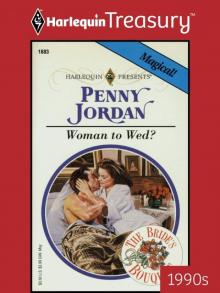 Woman To Wed?
Woman To Wed? Wanting
Wanting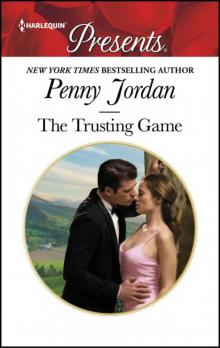 The Trusting Game (Presents Plus)
The Trusting Game (Presents Plus)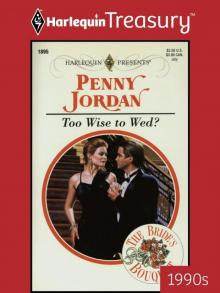 Too Wise To Wed?
Too Wise To Wed?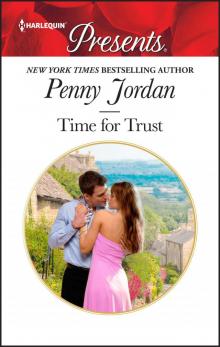 Time for Trust
Time for Trust Out 0f The Night (HQR Presents)
Out 0f The Night (HQR Presents) Dangerous Interloper (Lessons Learned II Book 8; HQR Presents Classic)
Dangerous Interloper (Lessons Learned II Book 8; HQR Presents Classic) Best Man To Wed?
Best Man To Wed? They're Wed Again
They're Wed Again Out of the Night
Out of the Night An Innocent's Surrender
An Innocent's Surrender Marriage: To Claim His Twins
Marriage: To Claim His Twins Deal With the Devil--3 Book Box Set
Deal With the Devil--3 Book Box Set Matter of Trust
Matter of Trust Vacation with a Commanding Stranger
Vacation with a Commanding Stranger A Savage Adoration
A Savage Adoration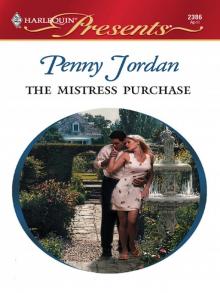 The Mistress Purchase
The Mistress Purchase Reclaimed by the Ruthless Tycoon
Reclaimed by the Ruthless Tycoon The Tycoon's Forbidden Temptation
The Tycoon's Forbidden Temptation Sinful Nights: The Six-Month MarriageInjured InnocentLoving
Sinful Nights: The Six-Month MarriageInjured InnocentLoving Bedding His Virgin Mistress
Bedding His Virgin Mistress Escape from Desire
Escape from Desire Claiming His Shock Heir
Claiming His Shock Heir Stronger than Yearning
Stronger than Yearning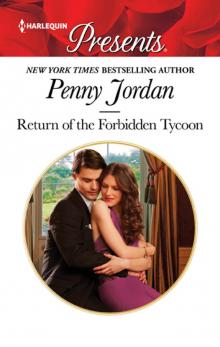 Return of the Forbidden Tycoon
Return of the Forbidden Tycoon Mission: Make-Over
Mission: Make-Over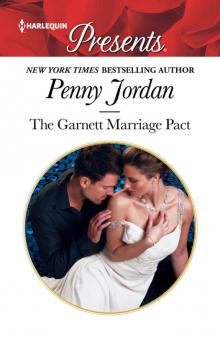 The Garnett Marriage Pact
The Garnett Marriage Pact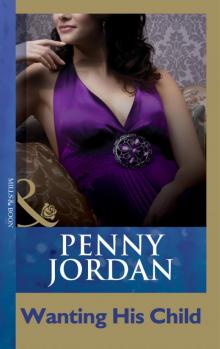 Wanting His Child
Wanting His Child A Little Seduction Omnibus
A Little Seduction Omnibus The City-Girl Bride
The City-Girl Bride Craving Her Boss's Touch
Craving Her Boss's Touch Starting Over
Starting Over Phantom Marriage
Phantom Marriage The Italian Duke's Virgin Mistress
The Italian Duke's Virgin Mistress One Night in His Arms
One Night in His Arms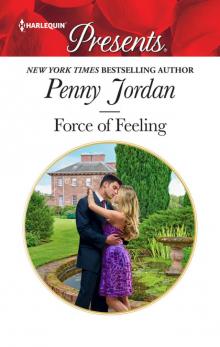 Force of Feeling
Force of Feeling Forbidden Loving
Forbidden Loving For Better for Worse
For Better for Worse Silver
Silver Rival Attractions & Innocent Secretary...Accidentally Pregnant
Rival Attractions & Innocent Secretary...Accidentally Pregnant A Bride for His Majesty s Pleasure
A Bride for His Majesty s Pleasure Desire's Captive
Desire's Captive Forgotten Passion
Forgotten Passion Taken Over
Taken Over Taken by the Sheikh
Taken by the Sheikh Sicilian Nights Omnibus
Sicilian Nights Omnibus Darker Side Of Desire
Darker Side Of Desire A Royal Bride at the Sheikh s Command
A Royal Bride at the Sheikh s Command The Ultimate Surrender
The Ultimate Surrender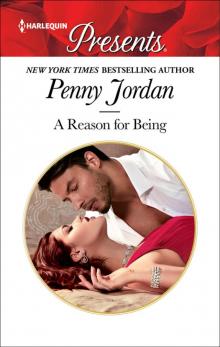 A Reason for Being
A Reason for Being A Cure for Love
A Cure for Love Bought with His Name & the Sicilian's Bought Bride
Bought with His Name & the Sicilian's Bought Bride Marriage Make-Up & an Heir to Bind Them
Marriage Make-Up & an Heir to Bind Them Bitter Betrayal
Bitter Betrayal Captive At The Sicilian Billionaire’s Command
Captive At The Sicilian Billionaire’s Command Valentine's Night
Valentine's Night The Convenient Lorimer Wife
The Convenient Lorimer Wife Reawakened by His Touch
Reawakened by His Touch Substitute Lover
Substitute Lover Passionate Protection
Passionate Protection The Hidden Years
The Hidden Years So Close and No Closer
So Close and No Closer Passion and the Prince
Passion and the Prince Virgin for the Billionaire's Taking
Virgin for the Billionaire's Taking Cruel Legacy
Cruel Legacy Payment in Love
Payment in Love The Wealthy Greek's Contract Wife
The Wealthy Greek's Contract Wife Penny Jordan Collection: Just One Night
Penny Jordan Collection: Just One Night Permission to Love
Permission to Love Beyond Compare
Beyond Compare When the Magnate Meets His Match
When the Magnate Meets His Match A Time to Dream
A Time to Dream Christmas Nights
Christmas Nights Christmas with Her Billionaire Boss
Christmas with Her Billionaire Boss The Sheikh's Baby Omnibus
The Sheikh's Baby Omnibus The Tycoon's Virgin
The Tycoon's Virgin Falcon's Prey
Falcon's Prey Mistress Of Convenience
Mistress Of Convenience The Perfect Father
The Perfect Father Stranger from the Past & Proof of Their Sin
Stranger from the Past & Proof of Their Sin A Little Revenge Omnibus
A Little Revenge Omnibus Loving
Loving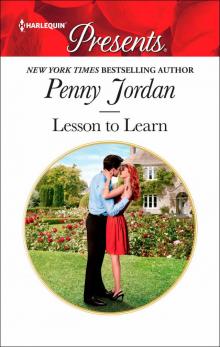 Lesson to Learn
Lesson to Learn Second Chance with the Millionaire
Second Chance with the Millionaire Payment Due
Payment Due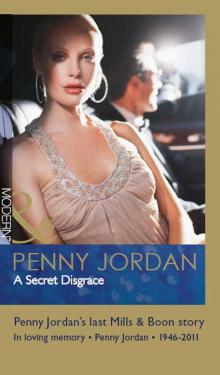 A Secret Disgrace
A Secret Disgrace Conveniently His Omnibus
Conveniently His Omnibus An Unforgettable Man
An Unforgettable Man The Tycoon She Shouldn't Crave
The Tycoon She Shouldn't Crave Pride & Consequence Omnibus
Pride & Consequence Omnibus The Dutiful Wife
The Dutiful Wife Bought With His Name
Bought With His Name The Friendship Barrier
The Friendship Barrier High Society
High Society The Price of Royal Duty
The Price of Royal Duty A Scandalous Inheritance
A Scandalous Inheritance At His Convenience Bundle
At His Convenience Bundle The Blackmail Baby
The Blackmail Baby Prince of the Desert
Prince of the Desert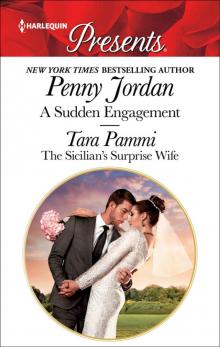 A Sudden Engagement & the Sicilian's Surprise Wife
A Sudden Engagement & the Sicilian's Surprise Wife Unexpected Pleasures
Unexpected Pleasures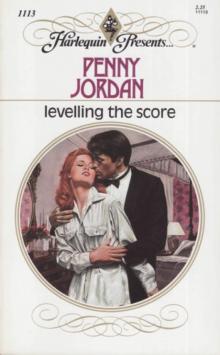 Levelling the Score
Levelling the Score Savage Atonement
Savage Atonement Dangerous Interloper
Dangerous Interloper A Passionate Awakening
A Passionate Awakening Ruthless Passion
Ruthless Passion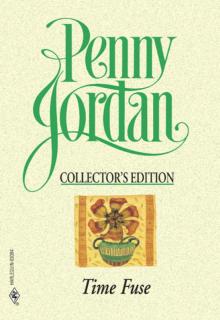 Time Fuse
Time Fuse Past Passion
Past Passion Her One and Only
Her One and Only The Innocent's Secret Temptation
The Innocent's Secret Temptation A Stormy Spanish Summer
A Stormy Spanish Summer The Marriage Demand
The Marriage Demand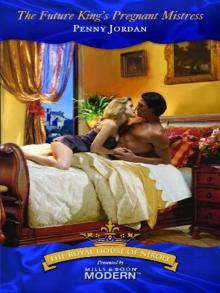 Future King's Pregnant Mistress
Future King's Pregnant Mistress Unwanted Wedding
Unwanted Wedding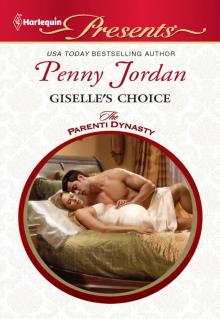 Giselle's Choice
Giselle's Choice Now or Never
Now or Never Blackmailed by the Vengeful Tycoon
Blackmailed by the Vengeful Tycoon Lovers Touch
Lovers Touch Scandalous Seductions
Scandalous Seductions The Power of Vasilii
The Power of Vasilii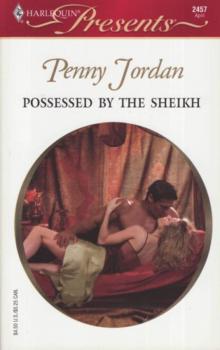 Possessed by the Sheikh
Possessed by the Sheikh It Happened At Christmas (Anthology)
It Happened At Christmas (Anthology) The Perfect Lover
The Perfect Lover The Flawed Marriage
The Flawed Marriage The Greek's Runaway Bride
The Greek's Runaway Bride An Unbroken Marriage
An Unbroken Marriage Hired by the Playboy
Hired by the Playboy The Blackmail Marriage
The Blackmail Marriage Daughter of Hassan
Daughter of Hassan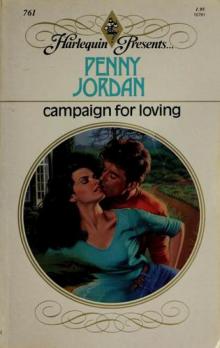 Campaign For Loving
Campaign For Loving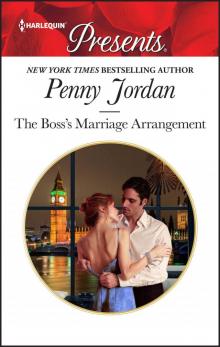 The Boss's Marriage Arrangement
The Boss's Marriage Arrangement Seduced by the Powerful Boss
Seduced by the Powerful Boss Marriage Without Love & More Than a Convenient Marriage?
Marriage Without Love & More Than a Convenient Marriage? Bride in Name Only
Bride in Name Only Her Shock Pregnancy Secret
Her Shock Pregnancy Secret Propositioned in Paradise
Propositioned in Paradise The Only One
The Only One The Sicilian s Baby Bargain
The Sicilian s Baby Bargain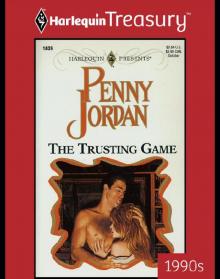 The Trusting Game
The Trusting Game The Most Coveted Prize
The Most Coveted Prize One-Click Buy: September Harlequin Presents
One-Click Buy: September Harlequin Presents In Her Enemy's Bed
In Her Enemy's Bed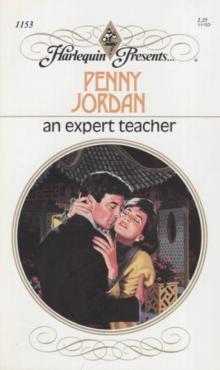 An Expert Teacher
An Expert Teacher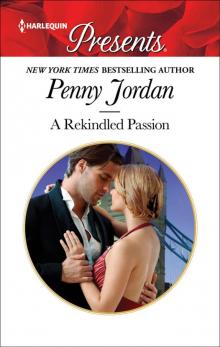 A Rekindled Passion
A Rekindled Passion The Reluctant Surrender
The Reluctant Surrender Shadow Marriage
Shadow Marriage A Scandalous Innocent
A Scandalous Innocent Forbidden Kisses with the Boss
Forbidden Kisses with the Boss Bound Together by a Baby
Bound Together by a Baby Second-Best Husband
Second-Best Husband Response
Response His Untouched Bride
His Untouched Bride A Kind of Madness
A Kind of Madness Past Loving
Past Loving His Blackmail Marriage Bargain
His Blackmail Marriage Bargain For One Night
For One Night Legally His Omnibus
Legally His Omnibus Back in the Marriage Bed
Back in the Marriage Bed Man-Hater
Man-Hater